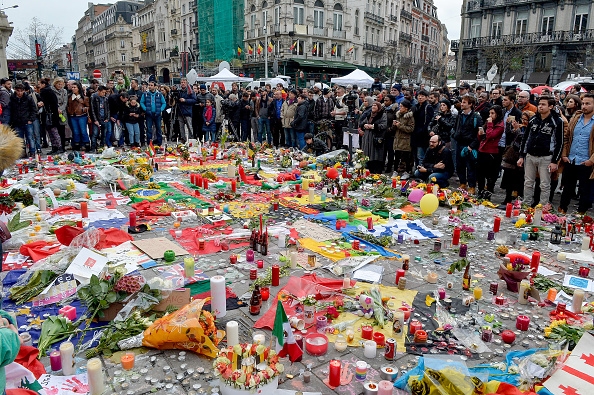You have /5 articles left.
Sign up for a free account or log in.

Brussels, after the terror attacks
Getty Images
The University of Illinois at Urbana Champaign had 53 undergraduate students in Belgium at the time of the terrorist attacks at the Brussels airport and a subway station last week. All the students were quickly accounted for.
“Our communications protocols worked well,” said Andrea Bordeau, the assistant director of international safety and security for Illinois International. “The phone lines were jammed, cell phones weren’t working, so I relied heavily on email and social media platforms to get students checked in with me as soon as I became aware of the attacks, and that was around 3:30 or 4 in the morning, local time here. I had the majority of students checked in with me, I would say, within 45 minutes.” A few students took slightly longer to check in because they were on planes traveling to other European cities for their spring breaks.
The terror bombings in the capital of the European Union have raised jitters about study abroad in the region of choice for most American students -- and the one that has historically been perceived as safe. Last Tuesday’s strike on Belgian transportation hubs, which the Islamic State, or ISIS, took responsibility for, followed on the ISIS attacks on Paris in November, which claimed a study abroad student from the California State University at Long Beach and a doctoral student from Italy among its 130 victims.
Following the Brussels attacks, which killed 35 people, a U.S. State Department travel alert warns that terrorist groups continue to plan near-term attacks targeting transportation, tourist sites, restaurants and sporting events throughout Europe. The alert does not advise against travel to the continent but does recommend that U.S. citizens exercise vigilance and avoid crowded places.
At least one university, Texas Tech, has opted to avoid Brussels for the time being. But most universities seem to be continuing their programming in Belgium.
“We are not canceling the program or shortening the duration of the program, because at this time there is no guidance from either the U.S. Department of State or our international insurance providers or our peers institutions to do so,” said Bordeau, of Illinois.
At the same time, she noted that there is “a disconnect between what student perceptions are and what parent perceptions are …. I have not received a request from a student to come home. With that said, parents, they’ve reached their threshold. Many of the parents that I’ve heard from are really concerned and saying, ‘Look, is this the point when we just say, come home?’”
It’s too early to know whether universities will see a decline in study abroad numbers to Europe, which hosts slightly more than half of all Americans studying abroad. Historical data from the Institute of International Education show that the numbers of Americans studying in Spain and the United Kingdom did not fall in the aftermath of the Madrid train bombings in 2004 and the London subway bombings in 2005, respectively.
Beyond Europe, health and safety concerns seem especially salient in many locations around the globe. In Latin America, there is the emerging threat of the Zika virus and the particular risk it poses to pregnant women, who are advised by the Centers for Disease Control and Prevention to avoid travel to areas with Zika. The mosquito-borne virus has been linked to a birth defect, microcephaly, in which infants are born with abnormally small heads.
Safety concerns continue to limit study abroad destinations in large parts of Africa and the Middle East. It was, after all, not that long ago that American students interested in working on their Arabic had the option of studying in Syria, which hosted 104 American students in 2009-10, the last full academic year before the start of the Syrian civil war in 2011. Egypt used to be a popular destination, but continuing instability in the country has led to a dramatic drop in the number of Americans studying there (37 in 2013-14, down from 1,923 five years earlier).
Individual students have been victims of high-profile acts of violence in recent weeks and months: an American graduate business student on a Vanderbilt University program in Israel was fatally stabbed in what’s been characterized as a Palestinian terror attack earlier this month, and a University of Cambridge Ph.D. student who was doing sensitive research on labor unions in Egypt was found dead in Cairo in February with “extensive” signs of torture on his body.
In Turkey, on the border of the Middle East and Europe, a newly revised U.S. Department of State travel warning cites increased threats from terrorist groups; recent bombings have killed dozens in Istanbul and Ankara.
American colleges and universities typically have travel policies restricting study abroad in countries on the State Department travel warning list. Some universities have outright bans on university travel to countries with active travel warnings, while others allow individual students and academic units hoping to sponsor programs to petition to go to those locations.
How terror fits into risk calculations is difficult to manage. Study abroad has of course been dealing with terrorism for years: in addition to the Madrid and London bombings in 2004 and 2005, the Hebrew University of Jerusalem’s cafeteria was bombed in 2002, which killed nine people, including five Americans. Going back even further, 35 Syracuse University study abroad students were among those killed in the 1988 bombing of Pan Am Flight 103 over Lockerbie, Scotland.
Joseph Finkhouse, the associate director for health, safety and security for Boston University’s Global Programs, said his university, like lots of institutions, is going through an “enterprise risk management” process in which it evaluates various risks and judges their relative frequency and impact. “Terrorism is one that is infrequent but it could possibly have a huge impact on the university in lots of different ways,” he said.
At the same time, Finkhouse emphasized the importance of putting terrorism in context of other risks. “It’s human nature to emphasize threats that come from other human beings, but we know that travelers are much more likely to be killed or injured in motor vehicle accidents, for example. Drowning is always a risk. Illness is a risk,” he said.
Julie Anne Friend, the director of Northwestern University’s Office of Global Safety and Security, made a similar point. “Even though I understand and I’m happy to talk to any parent or colleague about how to think about terrorism and how to incorporate it into a predeparture orientation program, we are still more likely to spend our time on things that we have documented evidence are more likely to harm our students overseas, and those are things like road accidents, water safety and pre-existing [health] conditions.”
“The reason we can focus on those things is because the traveler has some capacity to manage their exposure to risk, whereas there is not much a traveler can do to manage their risks associated with certain acts of terrorism other than not to go somewhere,” Friend said.
Bill Bull, the vice president for program management for the nonprofit study abroad provider the Council on International Educational Exchange, said that of the 1,600 students who signed up for its European programs this spring, only one chose not to attend because of stated concerns about safety. A handful of students from CIEE’s fall semester programs went home early after the Paris attacks.
Bull said that CIEE’s message to students and parents is that it has emergency protocols and systems in place -- such as an emergency notification system that the provider put into use after the attacks in Brussels -- and it has staff who are knowledgeable about the host culture and country and trained in emergency and crisis response. CIEE noted in a blog post on its website after the Paris attacks that in its emergency planning it also relies on “the services of an evacuation assistance provider and security intelligence services that furnish us with daily and, at times, hourly updates.”
“Our messaging is that we’re prepared to the extent that anyone can be prepared for such things,” Bull said. “At the end of the day, though, everyone has an internal risk tolerance and families need to sit together and make decisions about what they’d like to do.”
Texas Tech University had four students in Brussels at the time of the attacks, all of whom were traveling on a break from the university’s program in Seville. The university has decided to suspend programming to Belgium through at least the coming fall, and as such has rerouted a multicountry program planned for the summer that was originally going to pass through Brussels.
Tibor Nagy, Texas Tech’s vice provost for international affairs and a former U.S. ambassador to Ethiopia and Guinea, said the decision was motivated by concerns about the fragmented nature of Belgium’s government, divided as it is between Dutch- and French-speaking factions, and the reported weaknesses of the country’s security services, combined with the fact that a disproportionately large number of Belgians have traveled to Syria to fight for the Islamic State, more on a per capita basis than any other European country. “All things being equal,” Nagy said, “why not pick destinations that at least statistically would be safer right now?”
Nagy said institutions, like individuals, have different levels of tolerance for risk, and Texas Tech’s is relatively low. He attributed this both to his own background in the State Department and to the population of students the university serves.
“Texas Tech is one of those universities where a large number of our students are the first ones in their families to go to a university and a large number of our study abroad participants are the first members of their families to ever have a passport,” he said. “I think as an institution we are more conservative in approaching our destinations. A lot of our families are concerned enough just with students going overseas.”








